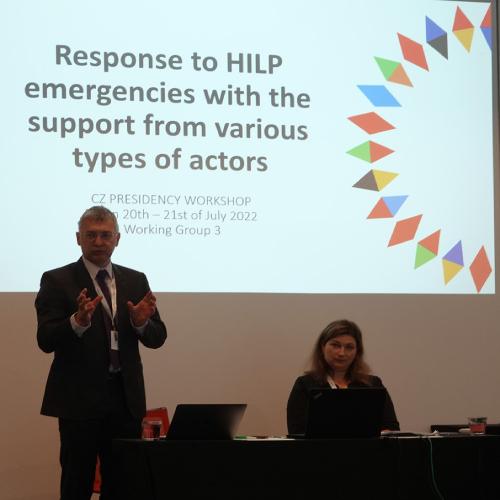
Prevention, Preparedness and Response workshop
The Czech Presidency of the EU Council, with the support of ECHO, organised a workshop on “Prevention, Preparedness and Response to long-term emergencies” on 20-21 July 2022.
The Czech Presidency of the EU Council, with the support of ECHO, organised a workshop on “Prevention, Preparedness and Response to long-term emergencies” on 20-21 July 2022. More than 60 civil protection experts met in Pilsen to discuss the definition of “long-term emergency”, explore what types of emergency can be classified as long-term and define the role and added-value of Union Civil Protection Mechanism (UCPM) in addressing them.
The recent long-term emergencies and the strong engagement of civil protection authorities showed that population preparedness policy is invaluable in response management and in limiting the magnitude of impacts. Increased self-sufficiency of the population enables emergency authorities to provide rapid and effective assistance where it is most needed. Someone who is well-informed and prepared can take action and also help others.
Director-General of the Fire Rescue Service of the Czech Republic Lieutenant-General Vladimír Vlček was pleased that participants appreciated the Czech Project “World of rescue”. He said: “I think that this effective and modern approach to population preparedness will increase resilience of our societies and should be further explored in other countries and at the EU level. I also agree that we should address the growing importance of continuous risk, emergency and crisis communication with the public.”
Forest fires are the typical example of a long-term emergency related to climate change. This year’s forest fire season in Europe was much worse than any previous year. This year we are also seeing for the first time an increase in the fire risk in Central Europe. The forest fire in the Bohemian Switzerland National Park (northern Czechia) and in the Saxony Switzerland National Park (central-eastern Germany) is an upsetting example.

The Workshop discussion focused on three types of response capacities that are typically needed for long-term climate change-related emergencies - emergency shelter, emergency energy supply, and water availability (drinkable, technical and fire water).
An important conclusion of the Workshop is to establish an Operational Management Board of senior representatives of national CP authorities during long-term emergencies. The Board would combine operational understanding of the UCPM with decision-making powers, and adapt its functioning to the needs of long-term emergencies with complex cascading effects. The mandate and responsibility of the Board would need to be carefully defined for it to have clear benefit and avoid overlaps with existing coordination structures. It would be integrated into existing structures, i.e. closely linked to the integrated political crisis response (IPCR) arrangements and regular meetings of operational 24/7 contact points during emergencies. Differing from IPCR high-level round tables, the Board would take operational decisions on the UCPM’s most effective functioning during the long-term emergency, possibly based on specific arrangements for long-term emergencies to be established.
"The workshop provided a great opportunity for exchange on the characteristics of long -term crises, their common challenges and the role of the UCPM. The discussions on population preparedness and resilience were also particularly interesting. Participants agreed that the cooperation between Member and Participating States could be strengthened further."
Member States called for simplification and increased flexibility in the response to long-term emergencies with high impact. They expressed the need to reduce administrative burden and the timelines for decision-making to allow channelling the required high amounts and different types of assistance as effectively as possible where it is needed most. Long-term emergencies are more likely to require a quick coordination on national procurement actions, an easier use of joint procurement modalities at European level and potentially also the option of direct procurement through the European Commission.
It was agreed that the debate during the workshop was only a starting point for other more detailed discussions in the future. These topics are often beyond the strict boundaries of civil protection authorities.